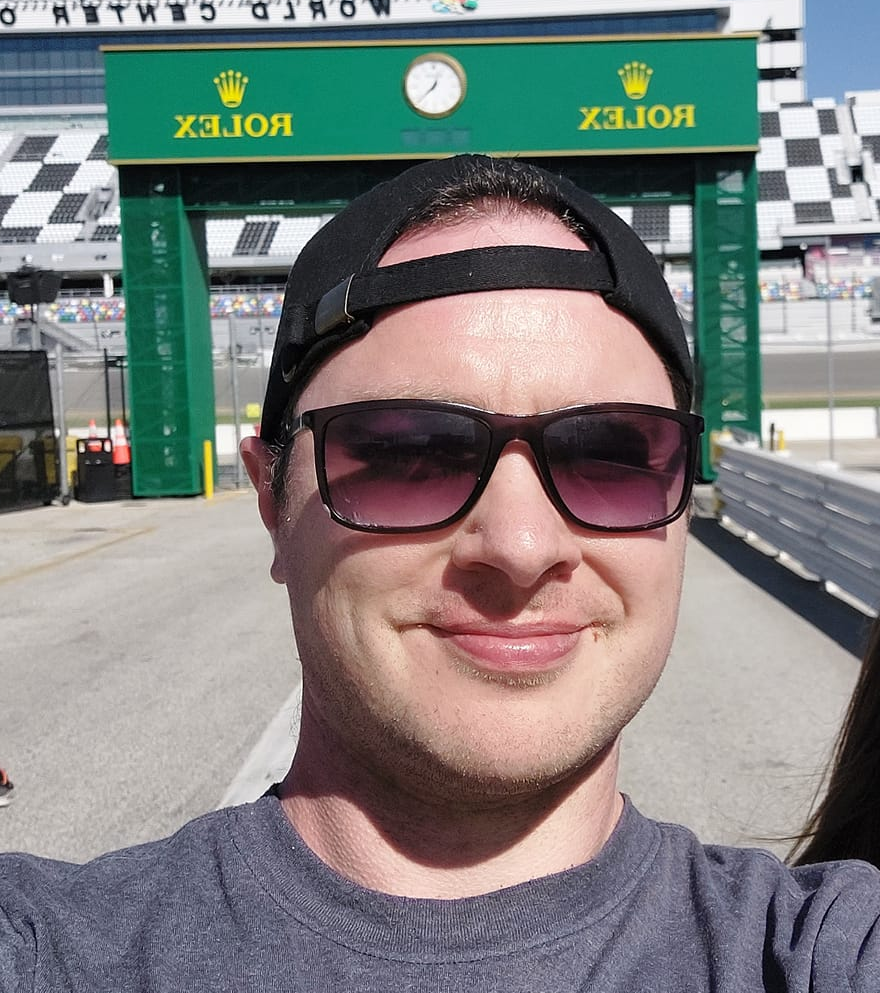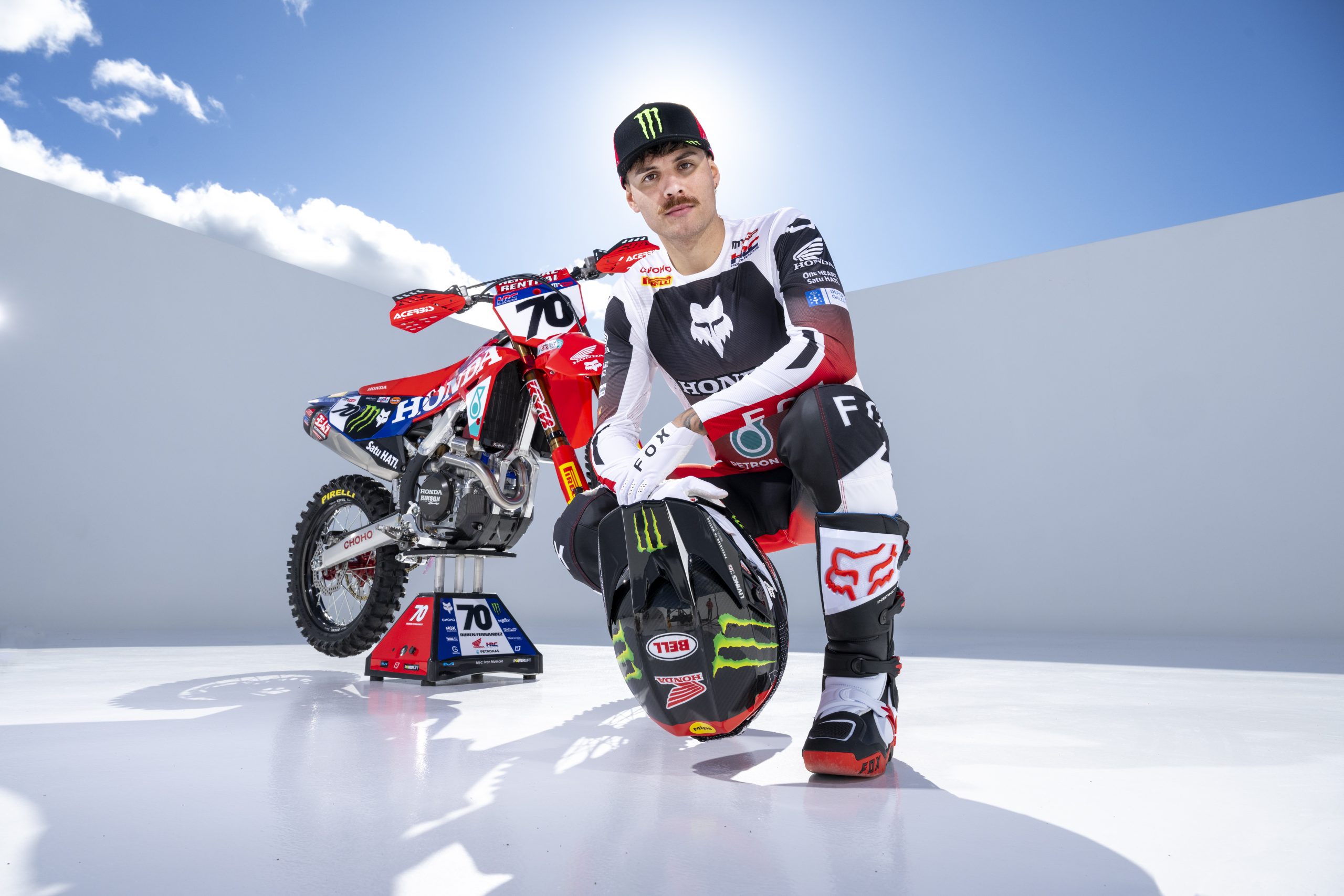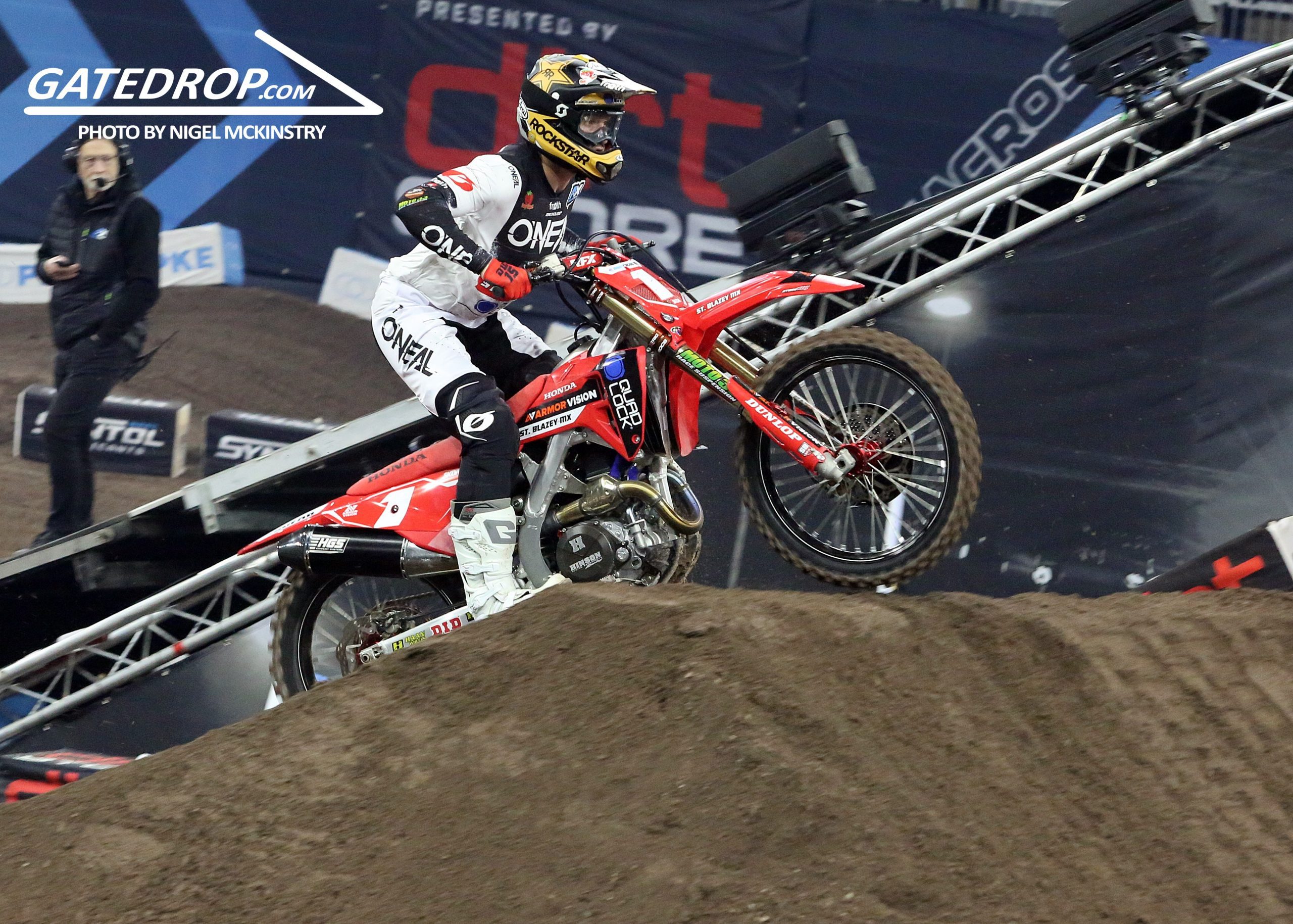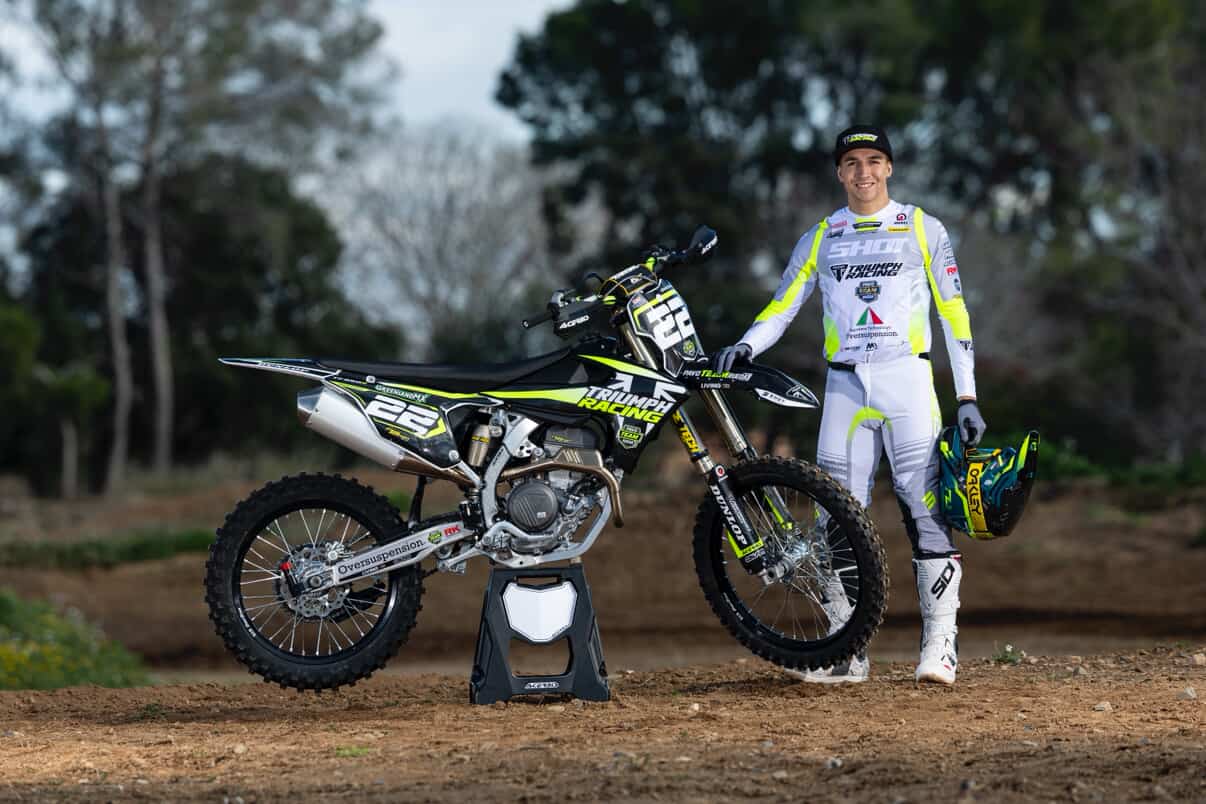We managed to catch up with the king of Supercross, Jeremy McGrath, at Ironman MXoN to talk about his illustrious career that saw McGrath become the global superstar of the 90s with two 125 supercross titles, a 250 AMA motocross title, a record seven 250 supercross title and 72 250 supercross wins, it is a record of titles and wins that Jett Lawrence has said he is chasing – proving that McGrath is still the reference in Supercross, nearly 25 years since he retired!
We had the privilege of chatting to McGrath about his career just after he signed some cool 90s McGrath jerseys for a fan!
GateDrop: Jeremy McGrath, you were just signing some old jerseys there to bring back some memories. A Pro-circuit jersey and I think one from 95 there as well.
McGrath: Yeah, yeah, it’s funny. That was a nice flashback. We had a 91 jersey, a 92 jersey, a 95 number 3 Fox jersey, and maybe something else .But yeah, it’s always funny, you know, you bring back a lot of fun memories from back in the day. Certain stuff stands out, certain stuff doesn’t. But yeah, some of the really old school stuff, it really stands out.
GateDrop: If you think back in 95, whatever, 30 years later, people would become a new jersey to reconnect all those memories again.
McGrath: Well, no, I mean, you know, it’s hard to imagine, you know, it’s hard to imagine 30 years ahead, obviously, right? But it’s also hard to imagine that anyone would give a sh*t, really, for that matter, 30 years later. But if you come to an event like this, there’s some history buffs and a lot of people that are into the history of the sport. I was really happy to be part of it. So it made my stamp on the sport and I was lucky to be part of it.
GateDrop: Jett Lawrence technique seems to be a level above everybody’s now, but that was you in the 90s. At what point did you realize, coming up, that you had something extra that the rest didn’t?
McGrath: You know, I think I knew right away, especially in Supercross when I was a kid, because I was doing stuff that other kids that were my speed could not do, right? I was doing pro style stuff when I was like a novice or intermediate. So it was always interesting to see that. So when I made the decision to turn pro and motocross and sort of try to make a living at it. It was tough for me because I really wasn’t that good at motocross, but I knew I was going to be good at Supercross.
So I had to get good enough at motocross so I could get a sponsor from Honda or somebody to give me a chance. As soon as I got to Supercross, then you see what, you know, what we saw. So even I always say this now, it took me four or five years to even figure out how to ride a motocross track like this, especially in the mud and I’m racing guys like Jeff Emig and these guys that are really seasoned motocross pros, you know? So it was a struggle in the beginning for sure. But I always knew I’d be good at Supercross because I just had a level that nobody else had. That’s kind of like what we’re seeting with Jeff Lawrence. So it’s pretty impressive. I don’t think until somebody challenges him, we’re not going to see his full potential yet. I mean, he’s got another gear if he needs it, it’s not a problem.
GateDrop: When people challenged you, I guess Jeff to an extent, but Ezra Lusk was a big guy at the time, really aggressive. But did you always feel you had those guys covered on a consistent level? Because it seemed like a race here and there that they could win, but you always struck back straight away.
McGrath: I always felt like, you know, I mean, look, it’s not my night. It wasn’t my night every Saturday night. I mean, I feel like I had a good shot. But, you know, anyone like Windham or Lusk or Emig, for that matter, Larocco, Kiedrowski, you know, Stanton, some of the guys, you know, anyone can have a brilliant night, especially when you go to a home race like when Jeff beat me at St. Louis, that’s his home race. I struggled, the track was soft and it was rutty. I mean, Larocco took, me out of the track, all that shit.
So, yeah, I mean, I had a tough time that night, but it was, you know, when you have the energy of the home crowd, it makes a big difference. And, you know, every rider on the gate has a home track at some point, right? It was kind of like me at Anaheim. Nobody could beat me at Anaheim. That was my home track and that’s where I was probably at my best all the time. But, yeah, for the most part, I wasn’t too worried about it. I knew that I was at least in the hunt every week and just try to strike back the next week.
GateDrop: That Emig win at St. Louis, is that the race you wish you could have back in your career? Or are you at peace? A perfect season would have been amazing.
McGrath: Not really. I mean, a perfect season would have been cool. But look, if we didn’t have that race, nobody would even talk about it. You know what I mean? I always say that’s the night I made him famous. But it’s also, it also made me more famous because it was like, oh, the night I’d lost, but it’s the night he won. So, we crack up about that now, it’s just too funny. But yeah, I mean, it is what it is. Look, I was lucky. I was one of the guys that could win all the time, which was, you know, it’s a dream. So anyway, a lot of guys were pissed that they just couldn’t win. You know what I mean? So I’m one of the lucky ones, I guess.
GateDrop: You were just talking to Jeff Emig there now. Everything seems friendly, you know, but back in that 90s time, how intense was it? I know in that Pay Dirt movie, it seemed really intense.
McGrath: Well, it was really intense. In the 90s, it was really intense. Yeah, I didn’t like him at all and he didn’t like me either. I mean, he was very arrogant and I don’t like that kind of act. You know, I don’t like that kind of attitude, really. It’s just… I was cocky, I’ll say that. I was, you know, I walked the line between confidence and arrogance is what I like to say. But, you know, I never was kind of a d*ck like he was, I thought. So look, we’re older now. It’s just water under the bridge.
And in fact, we’re working on a really cool movie together called Moto 90s. I mean, all that sh*t is in the past. But yeah, it was true. We didn’t like each other.
GateDrop: So how then did you come together for the Motocross of Nations? Was there any issues there with the team or you all just team USA at that point?
McGrath: I mean, look, we had two teams together, him and I, we didn’t like each other at any of those teams. But in 96, I was the best guy in the world at that point. So I look, you know, you come together for your country. That’s what you do, put all that shit aside and just just get on with the racing. So we had a job to do. And yeah, after that, we went back to hating each other. 97 is the next year he beat me in Supercross. So yeah, I didn’t like him.
GateDrop: That Suzuki year, how frustrating was that, you were like a flat tire away from winning the championship. It wasn’t as bad as it looked, really.
McGrath: The Suzuki wasn’t as bad as it seemed. It took us a few weeks, a few months to figure it out, really. But for the most part, it was it was good. I mean, you know, once we got those conventional forks off there and then we put Honda forks on the front, Showas. So, by the time the series was ending, I mean, I felt like I could win on the weekends on that bike, but it’s just it’s unfortunate because, you know, the clutch gave out a few times and, you know, I crashed a few times and the flat tire didn’t help. And I only lost by a couple of points.
But again, you know, I could go back and and try to go, you know, hey, if I would have won that series life might have been different, right? I might have stayed with Suzuki. Who knows what it would happen if I would have stayed with Suzuki for the next couple of years? Maybe I would have been able to win. Maybe not.
But I went to the Yamaha, me and Lusk switched spots and the Yamaha was just like my Honda and I went back to winning. It’s hard to say what all that happens. But the Suzuki year gave me a really good reset. Gave me a time to really get motivated again and go back to winning. So it’s good.
GateDrop: How much did you actually train? Because I always have these visions of you and Jeff at a party. And Mike Larocco just training in his house. And then you go out and beat him again – he must have just been going mad.
McGrath: I mean, I think part of Jeff’s plan, too, and my plan, too, is I wanted everyone to think I was not training, right? I would just be like, yeah, I’m blowing it out on the weekends at the lake and, you know, f**king off all the time. But I was training myself. I mean, I was stealth training. I was training a lot like 95, 96, nobody was training harder, right? So everyone’s like, oh, they have a suit, all this stuff. And yeah, we weren’t afraid to throw down when it was time. But for the most part, I was working my ass off. So we played mind games to fu**k with Jeff all the time. A lot of that was, you know, and even Stanton at the end of Stanton’s career, which I love, Stanton, he’s one of my favourite guys and I look up to him. But, you know, I just used to make everyone think that I wasn’t doing sh*t and then I’d go in on the weekends and they’re all like, what?
GateDrop: So what’s that pass on Jeff sort of confidence for you that you probably knew you could win. But at that point, it was like confirmation from there. It was just like you were the man for years. I mean, look, you got to find new ways to motivate yourself.
McGrath: I mean, when you win a lot, you got to find a new way to motivate yourself to win. I just constantly thought of myself as the underdog, constantly thought I was going to lose, constantly thought like, you know, next week is the time someone’s going to beat me. So I was motivated to keep training and do all that stuff.
But, you know, for eight, nine, ten years is hard. It’s hard to stay motivated to stay at the top. You know, I mean, I basically retired two generations of riders. Bradshaw, Stanton, those guys then Emig and those guys were gone before I was gone. And then I finally got to Carmichael. It took Carmichael three years before he beat me. So, I mean, I was, again, really one of the lucky ones to survive that kind of that length of a career and at the top. So, you know, I was fortunate to stay on my bike more than my friends, mostly. But yeah, I was just consider myself pretty lucky.
GateDrop: The final thing was every year you always had the coolest gear, the coolest style. Like in my head, that’s what I remember growing up as much as the winning, obviously the winning helps make you look even cooler. But was that a conscious thing for you to look cool in the nicest gear and like even the Suzuki years, the Fox gear was cool.
McGrath: Yeah, it was important to me to set an image and set the bar on looks, you know, I constantly was changing. Fox was really good with me on that. No Fear gear was really good with me on that. But a lot of the time, you know, Troy Lee and I are best friends. So to have a guy like Troy Lee, one of your best friends as an artist and a painter. We’re always having cool helmets and wild ideas and taillights and all kinds of cool sh*t on my helmets. I mean, that that was really a big part of it. So I was always just trying to do stuff that nobody else had. One-off sh*t that nobody could get and then if you win in it, it just makes it even better. So just try to do that.
GateDrop: That’s why people 30 years ago are bringing back those shirts.
McGrath: That’s right. That’s why people still remember, right? Because there’s plenty of guys…we know that are a lot younger than me, where are they? Nobody knows. Nobody knows where they are. So again, I’m one of the fortunate ones, man. I love the sport and I love the fans and I’m happy to be here and enjoy it.

















